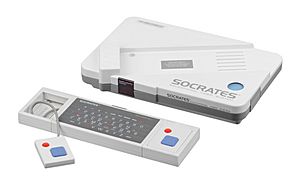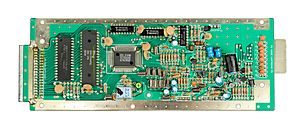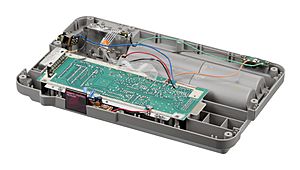VTech Socrates facts for kids
 |
|
| Also known as | Prof. Weiss-Alles Professeur Saitout |
|---|---|
| Manufacturer | VTech |
| Type | Educational home video game console |
| Generation | Third generation |
| Release date | 1988 |
| Discontinued | Early 1990s |
| CPU | Zilog Z80A at 3.57 MHz |
| Graphics | Custom |
| Predecessor | VTech Creativision |
| Successor | V.Smile |
The VTech Socrates was a special kind of video game console made by VTech in 1988. It was designed to help kids learn while they played! This console was called an "8-bit" system. It had a robot character named Socrates, just like the famous old philosopher. This robot looked a lot like Johnny Five from the Short Circuit movies. The Socrates console was stopped being made in the early 1990s.
The system came with cool wireless controllers. These controllers sent signals using infrared light, like a TV remote. In Europe, a company called Yeno sold the system. In Germany, it was called Prof. Weiss-Alles, which means "Professor Knows-Everything". In France, it was known as Professeur Saitout; Jeu Educatif Video. "Saitout" means "Knows All" in French. VTech also sold the system in Canada as the Socrates Saitout; Jeu Educatif Video.
Contents
Games and Learning Activities
The main Socrates system came with five types of learning activities built right in. These were Math Problems, Word Problems, Word Games, Music Games, and Super Painter.
- Math Problems and Word Problems helped you practice basic math, spelling, word meanings, and how to build sentences.
- Word Games included fun games like hangman and anagrams. There was even a racing game where you spelled words to finish laps!
- Music Games let you create simple tunes or listen to classic folk songs. You could also play a "Simon Says" game using different musical notes.
- Super Painter was like a digital art studio. You could draw on the screen using different brushes, colors, backgrounds, and even clip art. VTech later made other toys based on this Super Painter idea.
You could also buy more games separately. These games came on cartridges that looked like small floppy disks. They were split into two groups:
- Brain Teasers (with blue labels) tested your memory and problem-solving skills.
- Awareness games (with red labels) taught you fun facts about things like trivia, math, and geography.
Some extra tools for the system also had their own cartridges:
- The CAD Professor used a special mouse tablet. It helped you learn about designing buildings, clothes, and fabrics.
- The Touch Pad was for younger kids. It let them practice writing letters, numbers, and drawing shapes. You could also use it with the Super Painter program. Sometimes it was hard to see if what you drew on the Touch Pad would show up correctly on the TV.
The system could even talk! You could buy a separate voice cartridge that worked with all the games. This made the learning experience even more interactive.
Even though the Socrates had a fast processor (its Zilog CPU was 3.57 MHz, faster than the Nintendo Entertainment System's 1.79 MHz), it often felt slow. It could take several seconds for a picture to appear on the screen. The system would "draw" images line by line, filling in colors. It's not clear if this was a special effect or just because the system was slow. There was also a noticeable delay between pressing a button and the system responding.
Popular Socrates Games
Here are some of the games that were released for the Socrates system: This color means the game needed a separate accessory.
| English Title | What it's about | Age | Type |
|---|---|---|---|
| Amazing Mazes | Find your way through fun mazes. | 5+ | Brain Teasers |
| Around the World | An adventure learning about world geography. | 7+ | Awareness |
| CAD Professor | Learn about design. | ? | Needs Mouse |
| Facts 'N Fractions | Learn about fractions, mixed numbers, and decimals. | 8+ | Awareness |
| Game Wizard | Games that test your strategy and logic. | 8+ | Brain Teasers |
| Hodge-Podge | Word games that make you think! | 8+ | Brain Teasers |
| Memory Mania | Memory games that challenge your brain. | 6+ | Brain Teasers |
| Numbers, Shapes & Letters | Practice writing numbers, shapes, and letters. | ? | Needs Touch Pad |
| State to State | A journey learning about the United States. | 8+ | Awareness |
How the Socrates Console Worked

The Socrates system came with a wireless keyboard and two controllers that were attached to it. The keyboard sent infrared signals to a receiver on the main console. How well the console received these signals could vary. Some consoles worked from up to twelve feet away, while others needed you to be closer and point directly at the receiver. The Mouse and Touch Pad accessories also used infrared signals. Sometimes, these signal issues made the add-ons harder to use.
Price and Why It Left the Market
When the Socrates first came out, it was quite expensive, costing up to $130. This made it more costly than many other educational toys, and even some of VTech's own products. The Socrates also came out when other popular video game consoles, like the Sega Master System and the very popular Nintendo Entertainment System, were becoming less common.
Because the Socrates didn't have many games and was quite slow, it quickly became outdated. People started expecting faster speeds, better graphics, and more engaging games, even for educational titles. The Socrates was stopped being made after only a few years. Today, it's considered quite rare. People are still trying to make it work on computer emulators, like the MESS project. In the last ten years, some people who used to play with the Socrates have shared more information about it online.
See Also
 In Spanish: VTech Socrates para niños
In Spanish: VTech Socrates para niños
 | Anna J. Cooper |
 | Mary McLeod Bethune |
 | Lillie Mae Bradford |


